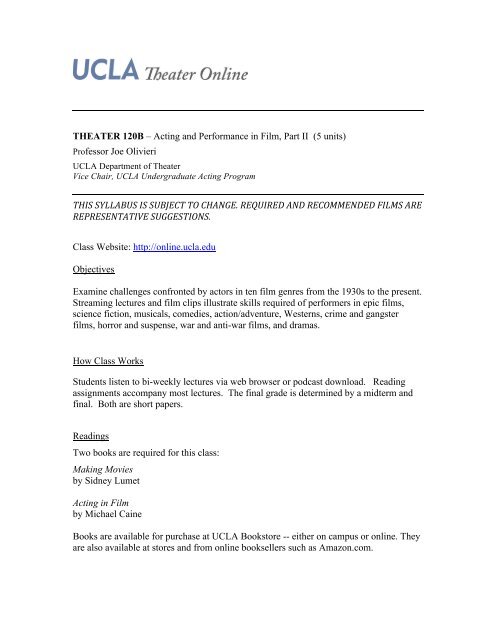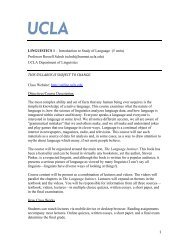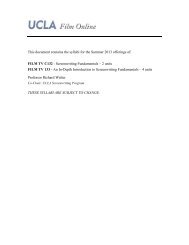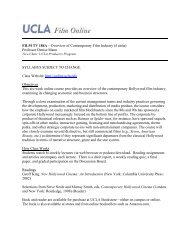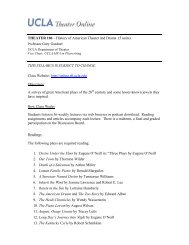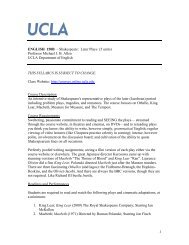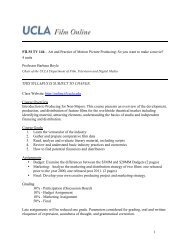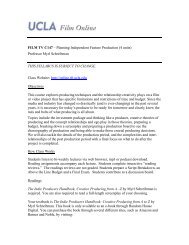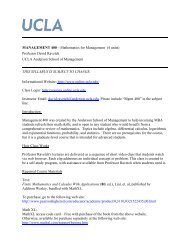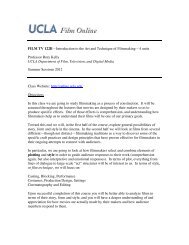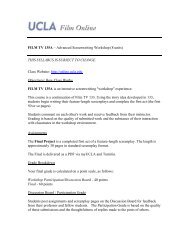Theater 120B Syllabus
Theater 120B Syllabus
Theater 120B Syllabus
Create successful ePaper yourself
Turn your PDF publications into a flip-book with our unique Google optimized e-Paper software.
THEATER <strong>120B</strong> – Acting and Performance in Film, Part II (5 units)<br />
Professor Joe Olivieri<br />
UCLA Department of <strong>Theater</strong><br />
Vice Chair, UCLA Undergraduate Acting Program<br />
THIS SYLLABUS IS SUBJECT TO CHANGE. REQUIRED AND RECOMMENDED FILMS ARE <br />
REPRESENTATIVE SUGGESTIONS. <br />
Class Website: http://online.ucla.edu<br />
Objectives<br />
Examine challenges confronted by actors in ten film genres from the 1930s to the present.<br />
Streaming lectures and film clips illustrate skills required of performers in epic films,<br />
science fiction, musicals, comedies, action/adventure, Westerns, crime and gangster<br />
films, horror and suspense, war and anti-war films, and dramas.<br />
How Class Works<br />
Students listen to bi-weekly lectures via web browser or podcast download. Reading<br />
assignments accompany most lectures. The final grade is determined by a midterm and<br />
final. Both are short papers.<br />
Readings<br />
Two books are required for this class:<br />
Making Movies<br />
by Sidney Lumet<br />
Acting in Film<br />
by Michael Caine<br />
Books are available for purchase at UCLA Bookstore -- either on campus or online. They<br />
are also available at stores and from online booksellers such as Amazon.com.
Screenings:<br />
Required and recommended films can be streamed at low resolution from the Class<br />
Website. Films chosen for assignments or papers should be viewed at full quality on<br />
DVD or via web services such as iTunes or Netflix.<br />
Assignments:<br />
1 – Midterm – 4 to 6 page paper based on lectures, readings and required films<br />
2 – Final – 4 to 6 page paper based on lectures, readings and required films<br />
Grade Breakdown:<br />
Your final grade is calculated as follows:<br />
Midterm – 50%<br />
Final – 50%<br />
Policies<br />
This class takes advantage of myUCLA and a third-party service known as Turnitin.<br />
Submissions are screened for improper citations and potential plagiarism. Quotes or<br />
ideas paraphrased from other work must be properly cited.<br />
SCHEDULE<br />
Week One<br />
Lesson 1: Epic Films<br />
Definition of “genre,” traits of the Epic Hero, personalization<br />
Reading:<br />
Required Viewing:<br />
Recommended<br />
Viewing:<br />
Making Movies<br />
Chapter 1 – The Director: The Best Job in the World<br />
Chapter 2 – The Script: Are Writers Necessary?<br />
Gladiator<br />
2000, Directed by Ridley Scott<br />
Doctor Zhivago<br />
1965, Directed by David Lean
Gandhi<br />
1982, Directed by Richard Attenborough<br />
Lesson 2: Science Fiction Films<br />
"Hero’s Journey," personalization of dystopian societies, environment as character<br />
Reading:<br />
Making Movies<br />
Chapter 3 – Style: The Most Misused Word Since Love<br />
Chapter 4 – Actors: Can an Actor Really Be Shy?<br />
Required Viewing:<br />
Recommended<br />
Viewing:<br />
Looper<br />
2012, Directed by Rian Johnson<br />
The Day the Earth Stood Still<br />
1951, Directed by Robert Wise<br />
Brazil<br />
1985, Directed by Terry Gilliam<br />
Week Two<br />
Lesson 3: Musicals<br />
Pursuing objectives through song and dance<br />
Reading:<br />
Required Viewing:<br />
Recommended<br />
Viewing:<br />
Making Movies<br />
Chapter 5 – The Camera: Your Best Friend<br />
Chapter 6 – Art Direction: Does Faye Dunaway Really Have the<br />
Skirt Taken in in Sixteen Different Places?<br />
Les Miserables<br />
2012, Directed by Tom Hooper<br />
West Side Story<br />
1961, Directed by Jerome Robbins and Robert Wise<br />
Moulin Rouge<br />
2001, Directed by Baz Luhrmann
Lesson 4: Comedies<br />
"Taking it seriously," commitment to given circumstance<br />
Reading:<br />
Making Movies<br />
Chapter 7 – Shooting the Movie: At Last!<br />
Chapter 8 – Rushes: The Agony and the Ecstasy<br />
Required Viewing:<br />
Recommended<br />
Viewing:<br />
Sullivan's Travels<br />
1941, Directed by Preston Sturges<br />
Damsels in Distress<br />
2011, Directed by Whit Stillman<br />
The Big Lebowski<br />
1998, Directed by Joel and Ethan Coen <br />
Week Three<br />
Lesson 5: Action and Adventure Films<br />
Heroes and villains with vulnerability, a characters’ need for power<br />
Reading:<br />
Required Viewing:<br />
Recommended<br />
Viewing:<br />
Making Movies<br />
Chapter 9 – The Cutting Room: Alone at Last<br />
Chapter 10 – The Sound of Music: The Sound of Sound<br />
Chapter 11 – The Mix: The Only Dull Part of Moviemaking<br />
Argo<br />
2012, Directed by Ben Affleck<br />
The African Queen<br />
1951, Directed by John Huston<br />
Work on Midterm Assignment<br />
The Adventures of Robin Hood<br />
1938, Directed by Michael Curtiz and William Keighley<br />
Week Four<br />
MIDTERM:<br />
4 to 6 page paper based on lectures, readings, required films
Lesson 6: Westerns<br />
"Hero’s Journey" continued, physical and non-verbal acting<br />
Reading:<br />
Required Viewing:<br />
Recommended<br />
Viewing:<br />
Making Movies<br />
Chapter 12 – The Answer Print: Here Comes the Baby<br />
Chapter 13 – The Studio: Was It All for This?<br />
Django Unchained<br />
2012, Directed by Quentin Tarantino<br />
Shane<br />
1953, Directed by George Stevens<br />
Lesson 7: Crime and Gangster Films<br />
Little Big Man<br />
1970, Directed by Arthur Penn<br />
Journey of the anti-hero, physical and emotional character work<br />
Reading: Acting in Film, pages 1-35<br />
Required Viewing:<br />
Recommended<br />
Viewing:<br />
The Blue Dahlia<br />
1946, Directed by George Marshall<br />
The French Connection<br />
1971, Directed by William Friedkin<br />
The Usual Suspects<br />
1995, Directed by Bryan Singer <br />
Week Five<br />
Lesson 8: Horror and Suspense<br />
Continuation of extreme character work, obsessive objectives, connecting with fear<br />
Reading: Acting in Film, pages 35-85<br />
Required Viewing:<br />
Laura<br />
1944, Directed by Otto Preminger
Recommended<br />
Viewing:<br />
The Shining<br />
1980, Directed by Stanley Kubrick<br />
The 39 Steps<br />
1935, Directed by Alfred Hitchcock<br />
Lesson 9: War and Anti-War Films<br />
Connecting to fervent beliefs, the need for occasional two-dimensional characters<br />
Reading: Acting in Film, pages 85-119<br />
Required Viewing:<br />
The Hurt Locker<br />
2008, Directed by Kathryn Bigelow<br />
Recommended<br />
Viewing:<br />
Paths of Glory<br />
1957, Directed by Stanley Kubrick<br />
The Pianist<br />
2002, Directed by Roman Polanski<br />
Week Six<br />
Lesson 10: Drama<br />
Emotional life, specific relationship work, spontaneity, commitment<br />
Reading: Acting in Film, pages 119-149<br />
Required Viewing:<br />
Recommended<br />
Viewing:<br />
Lincoln<br />
2012, Directed by Steven Spielberg<br />
Midnight Cowboy<br />
1969, Directed by John Schlesinger<br />
The Heiress<br />
1949, Directed by William Wyler<br />
FINAL: 4 to 6 page paper based on lectures, readings, required films


